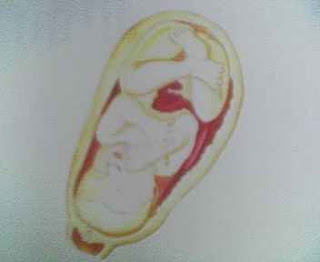Apparently, the additional energy require in our body is about 10% - 15% of the normal energy intake.Taking 2 cups of milk daily is the easiest example of the additional energy.But, during pregnancy all the food taken must be more compared to the normal human being needed.
Pay extra attention on the following nutrient might be help for better health for baby and the mother.
 Protein
ProteinProtein is essential for building tissues. An adequate supply of protein will help on the growth of the baby, placenta,uterus,breast tissue and blood supply. Milk,meat,fish,eggs and legumes are the excellent example of protein.Usually, mother eating a varied diet that includes lacto-ovo-vegetarian (vegetarian diet that includes eggs and milk) should not be facing any problem in protein requirement.
Instead, vegan (no animal products including eggs and milk) mothers need to be more careful with their diet as cereals, beans, and nuts do not contain the whole supplement or complement of essential amino acids on their own.Combination of them can help meet the need of amino acids.
 Amino acids are building block of protein. essential amino acids are those that our body cannot make and we need to get them from our diet.
Amino acids are building block of protein. essential amino acids are those that our body cannot make and we need to get them from our diet.Complementing Proteins
~ Cereals + Legumes
- Bread + peanut butter
- Chapatti or Tosai + dhall
- Corn soup + rice
- Tempeh + rice
- Glutinous rice dumplings filled with black sesame paste (in soybean milk)
- Rice sprinkled with sesame seeds.
- Wheat flake breakfast cereal or Oats with sunflower seeds
- Bean salad + sesame seeds
 Iron
IronIron is necessary for the manufacture of blood. It sis a major part of haemoglobin that carries oxygen around the body. Your blood supply increases during pregnancy, creating the demand for iron. Your baby needs iron for normal development too.
If your diet is lacking in iron, you could become anaemic. Liver, meat, kidney, poultry and fish are the best sources of iron. Liver is also high in vitamin A, which if taken in excess may harm your baby. So, do not eat liver more than once a week and always eat in small quantities. Green leafy vegetables, wholegrain cereals, nuts, raisins and beans contain moderate amounts. The iron in these foods is less absorbable. Eating a vitamin C rich food such as a slice of papaya or a glass of juice will increase the absorption of iron from vegetable sources.

Calcium
Both you and your baby need calcium for strong bones and teeth, normal blood clotting and functioning of nerves and muscles. Milk and other dairy foods are the best dietary sources of calcium because:
- Milk is rich in calcium
- The high levels of the milk carbohydrate i.e. lactose, and the presence of vitamin D increase calcium absorption.
Choose low fat dairy products whenever possible. If the increased requirement of calcium is not met by your daily intake, calcium will be drawn form your bones to meet your baby's requirement. After your pregnancy, if your diet continues to be low in calcium, your will be more prone to osteoporosis (brittle bones) later in life.Fish will edible bones, some soybean products (e.g. tofu) and green leafy vegetables are also good sources of calcium.
 Folic Acid
Folic AcidFolic acid, a B vitamin, is needed for the formation of new cells such as red blood cells. Deficiency may cause you to be anaemic and your baby will be at higher risk of Spina Bifida (Neural Tube Defect). Folic acid is found in food such as liver, kidney, dark green leafy vegetables, nuts, wholegrain cereals, orange and yeast extract.
Essential Fatty Acids.
Fatty acids are building blocks for fat. Essential fatty acids are fatty acids that our body cannot manufacture, thus must be obtained from food. These are linoleic acid (LA) acid (ALA). LA and ALA and alpha-linolenicara particularly important during pregnancy because of the constant demand of new cell formation.
LA and ALA is further processed n the body to arachidonic acid (AA) and docosahexanoic acid (DHA) respectively. AA and DHA are vital for proper growth and brain development of your baby.
Studies have shown that pregnant mums who eat plenty of "oily fisher" such as salmon, tuna, sardines, mackerel and cod have higher amounts of DHA passed on to their babies.
Most of us eat a diet that is high in LA and usually it is ALA that is limiting. This is because ALA is less widely found in food. Therefore, use cooking oil such as soybean and canolawhich are good sources of ALA and eat plenty of oily fishes to get DHA in your diet.
 You should avoid excessive weight gain. Excess weight can be hard to lose after your baby is born and can lead to long term overweight.
You should avoid excessive weight gain. Excess weight can be hard to lose after your baby is born and can lead to long term overweight.- You should not eat double of everything.
- Eat less of the following foods:
Sugary foods and drinks
Tips for healthy eating during pregnancy:
- Choose foods from the 5 food groups in adequate amounts to ensure a balanced diet
- Have 3 regular meals and 2-3 light snacks a day.
- Include generous helpings of fruits and vegetables, wholegrain cereals and beans to increase you fibre intake.
- Drink plenty of water and fluids such as low fat milk and fresh fruit juices.
- Eat "oil fishes" about 2-3 a week.
- Use canola or soybean oil in your cooking.
- Always eat fresh, wholesome foods. Processed foods usually have a high sodium content.
- Reduce caffeine intake by cutting down on coffee, tea and cola. Restrict tea or coffee to 1-2 cups daily, preferably drink weak tea or coffee.
- Avoid alcohol especially in the first trimester.













